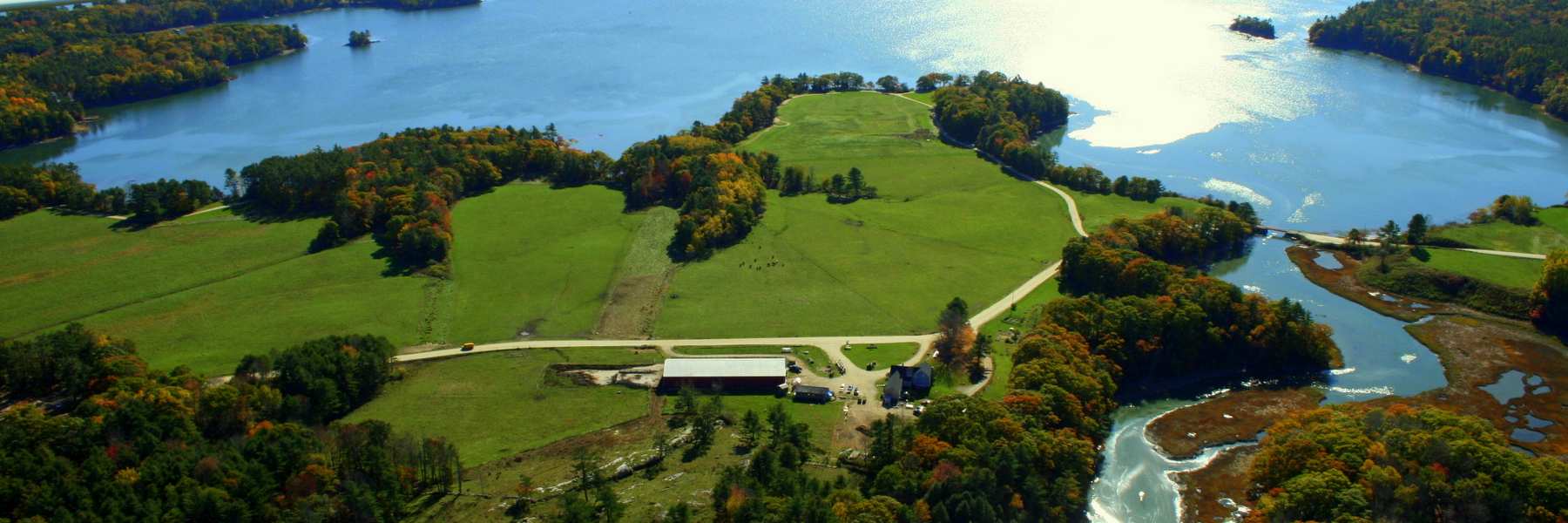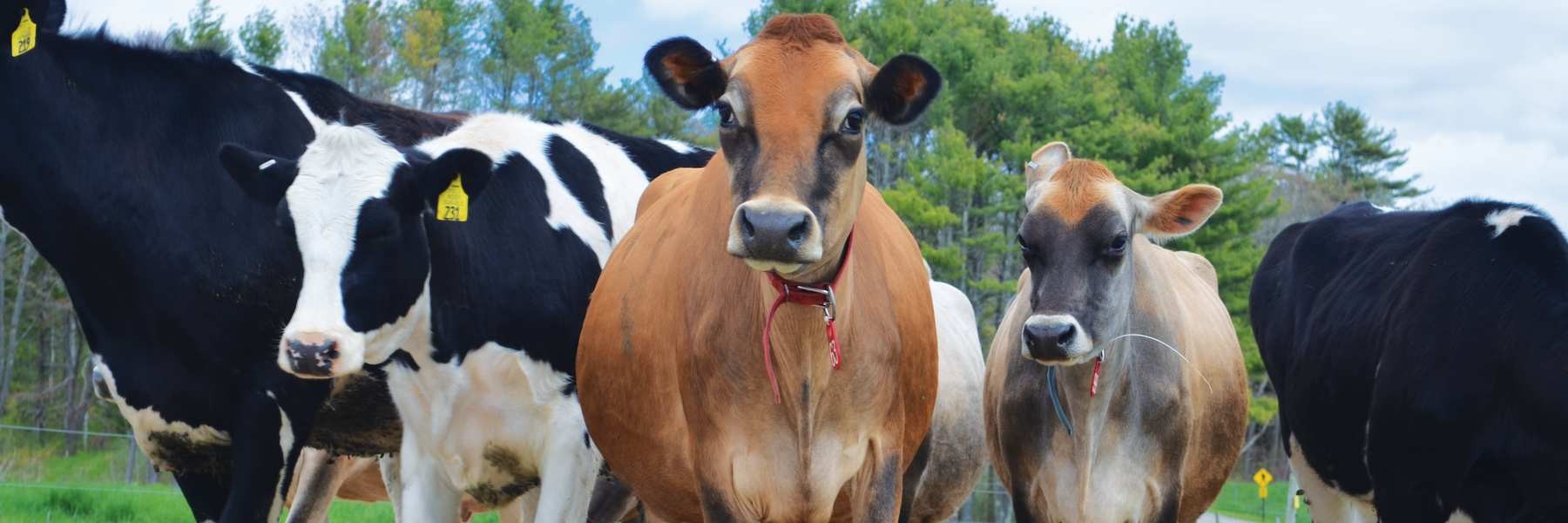Post-conference Tour of Wolfe’s Neck Farm Organic Dairy Farmer Training Program

With our first post conference function in twenty years of the Northeast Pasture Consortium, we were extremely fortunate to have a beautiful, bright sunny morning to be welcomed to Wolfe’s Neck Farm after what had been an overcast, showery 2 days while the conference was being held. Approximately 20 people were in attendance to listen to the background of Wolfe’s Neck Farm and what led them to decide to switch from a natural (grass-fed primarily but fed some grain; antibiotic and artificial hormone free) beef cattle operation to an organic dairy farmer training center. After that presentation, we then toured the barn to see the current operation with its newly installed milking parlor. Sarah Littlefield, Dairy Director, conducted this tour and gave us a milking parlor demonstration.
Dave Herring, Executive Director of the Wolfe’s Neck Foundation, greeted us and gave us the history of Wolfe’s Neck Farm and told us how they came about their decision to become an organic dairy farmer training center.
In 1947, Eleanor and her husband, Lawrence M.C. Smith, of Philadelphia, purchased what is now Wolfe’s Neck Farm, named for Henry Wolfe, who was the first settler on the Neck. This eventual 626-acre saltwater farm was the chance for the Smiths to begin their natural farming operation as a testament to their belief in the useful preservation and protection of open spaces.
The long-range planning of the farm began in 1949, when Eleanor Houston Smith became a member of the Cumberland County Maine Soil Conservation District. Eleanor liked to say she had “been in the conservation world since ‘conservation’ was a dirty word.”
In 1953, the Smiths began their natural farming operation with 9 cows and a bull and by 1959 the herd neared forty cattle. They farmed the land for years and worked to educate local farmers about how to best care for the land. They picked up additional farms as neighboring farmers next to them decided to sell their farms. In 1984, Eleanor and her children donated the entire farm holdings to the University of Southern Maine. In 1997, the farm was returned to the Wolfe’s Neck Farm Foundation and has operated as a nonprofit organization since that time.
From 1997, the natural beef cattle operation grew to be very large. Beef cattle belonging to area farmers were pastured on the property. This enterprise became a financial hazard to the Foundation when beef prices plummeted from time to time. The losses sustained in bad years were difficult for the Foundation to absorb as a non-profit organization. They decided that they needed to jettison such a large operation in favor of a smaller one that would be more stable or at least sustain minimal losses from time to time. They decided to switch from beef to dairy cattle. Mr. Herring said he knew this was unusual as farms usually switch from dairy to beef as aging dairy farmers decide to go into semi-retirement.

Since the farm has not used chemical fertilizers or pesticides for many, many years, the pastureland and hayland qualified as organic. Wolfe’s Neck Farm is now poised to train the next generation of organic dairy farmers. The Foundation received a 3-year, \$1,693,000 grant from Stonyfield Organic and the Danone Ecosystem Fund. Wolfe’s Neck Farm is launching a two-year residential Organic Dairy Farmer Training Program in partnership with Dairy Grazing Apprenticeship based in Madison, WI.
The Wolfe’s Neck program aims to increase the production of organic milk in the Northeast while fostering the next generation of organic dairy farmers. It will achieve this goal by partnering with new, transitioning, and existing organic dairy farmers to improve their practices and ensure long-term sustainability and production in this region. This program is the first of its kind in the nation. It is anticipated that the farmer interns will be housed in the farm houses at Wolfe’s Neck that were acquired with the purchases of nearby farms over the years while the Smiths were farming.
The Wolfe’s Neck Farm dairy will also be used for forage-based research, experimentation, demonstration, and training. They will feature and study innovative approaches for new farmers to reduce the initial capital investment, reduce financial risks, and build a viable operation.
The dairy is a pasture-based, low-grain operation and is organic certified by Maine Organic Famers and Gardeners Association (MOFGA). They intend to keep the herd small, about 60 milk cows to mimic most organic dairy operations in New England. They purchased a Dairy Master milking parlor with the intent of using it as a portable one. However, they did not realize that an optional item was necessary to make the parlor truly portable. Furthermore, there is a reticence among milk inspectors in approving portable milking units as they do not at all fit into conventional milking facility standards.
Therefore, it is being used as a stationary unit where it is attached by pipeline to an enclosed refrigerated milk bulk tank. The parlor can hold 8 cows at a time for milking. The cows walk onto a platform that can be raised once they are in it securely, so that the udders are at arm level for ease of cleaning them and putting on and taking off the milking pulsators. The milking parlor is at one end of the current free stall barn. They are working with Sarah Flack, a grazing consultant, to come up with a grazing plan that has a more centralized dairy barn to the pastures to keep travel distance to the farthest grazing paddocks less than a half mile. Once the new facility is built, the milking parlor will be moved to the new site.
A variety of animals still live at the farm besides the newly purchased dairy cows. Free-range Bronze Broad Breasted turkeys are raised for Thanksgiving. North County Cheviot-Suffolk sheep graze in the fields and lamb is sold. Goats and chickens are also raised on the farm. All the animals are raised on pasture that is free from synthetic fertilizers and pesticides and their grain fed to them is not laced with hormones or antibiotics.
The Farm is also following in the Smith’s tradition of educating the public about agriculture. They have created innovative educational programs that focus on preserving the environment and sustainable agriculture. They offer summer camp programs, spring and fall school field trips, adult education, and family events. They also offer a variety of volunteer events and opportunities throughout the year.

More than 2,500 children, 600 families, and 200 adults participated in their education programs at the Farm in the last year, learning about agriculture and the natural world. They continue to expand the variety and quality of their programs. Wolfe’s Neck Farm also offers a myriad of activities and recreational opportunities to their community. The Farm has over three miles of hiking trails, a river and bay to kayak and canoe in, great birding, country roads for biking, and opportunities to clam and fish. They also have a campground along the shores of Casco Bay. Recompence Campground has been welcoming camping families to their 115 spacious sites and cottages on the shores of Casco Bay since 1962.